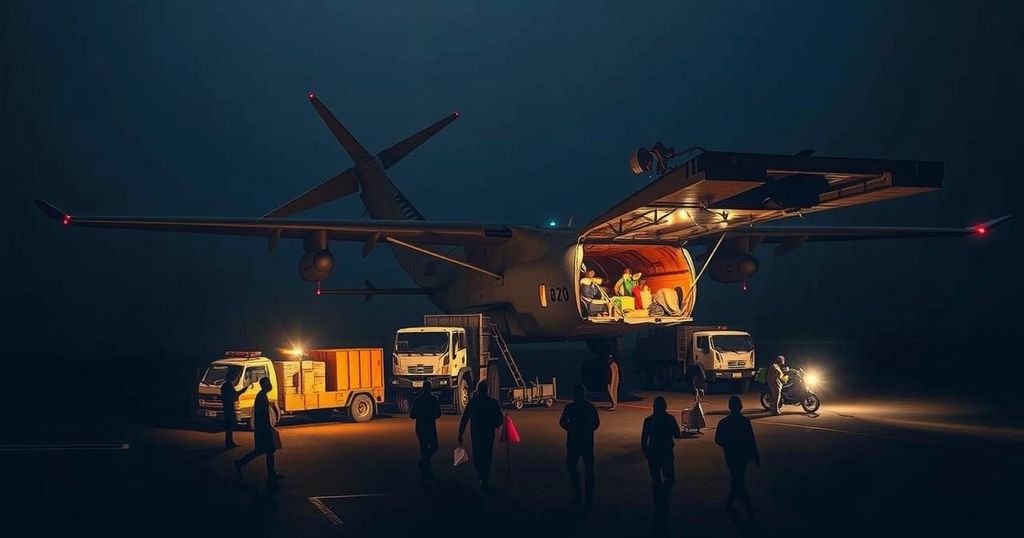Sudan has initiated an airlift to deliver 1,000 tonnes of humanitarian aid to South Kordofan, focusing on rebel-held territories. Supported by South Sudan, this operation follows diplomatic talks aimed at alleviating local suffering. The airlift comprises 78 flights of supplies, with the first arrival containing essential food and medicine.
On November 3, 2024, Sudan officially initiated an airlift operation to deliver 1,000 tonnes of humanitarian aid to the South Kordofan region, specifically targeting areas controlled by the rebel faction, the Sudan People’s Liberation Movement-North (SPLM-N). This operation stemmed from discussions between Sudan’s ruling council head Abdel Fattah al-Burhan and South Sudan’s President Salva Kiir, focusing on alleviating the humanitarian crisis in rebel-held territories. The airlift includes a series of 78 flights commencing from South Sudan’s capital, Juba, with the first aircraft arriving on Friday in Kadugli, carrying 16 tonnes of essential supplies including food and medicine. The aid is aimed at both Kadugli, which remains under government oversight, as well as the Julud area, which has been declared in a state of famine by the SPLM-N earlier this year. The operation is being facilitated in partnership with South Sudan’s Ministry of Humanitarian Affairs, signifying a collaborative effort to address humanitarian needs without political interference. The Sudanese Foreign Ministry emphasized that this airlift exemplifies its commitment to international humanitarian law and the need for accessible food and medical resources for its citizens. Furthermore, Sudan reiterated its focus on ensuring that humanitarian operations are conducted adhering to “moral and legal principles” and without politicization. As part of ongoing efforts, negotiations with the SPLM-N for establishing aid corridors are being pursued, although previous discussions mediated by South Sudan have encountered setbacks.
The humanitarian situation in South Kordofan has been dire, with significant portions of the population suffering due to conflict and famine, particularly in areas controlled by the SPLM-N. This insurgent group has been active in the region for years, challenging government authority and leading to increased instability. The region’s strategic significance, alongside its humanitarian needs, has drawn attention from neighboring South Sudan, which recently engaged with Sudan to facilitate aid delivery. Historical tensions persist between the governing bodies and rebel factions in Sudan, complicating efforts to provide relief and support to affected communities. Last May, negotiations regarding aid corridors to assist these struggling populations stalled, prompting renewed efforts to distribute humanitarian aid. This airlift represents a crucial logistical endeavor to mitigate suffering and establish a reliable supply of food and medical resources in a region that has faced significant challenges due to ongoing conflict.
The commencement of the airlift to South Kordofan is a critical step towards addressing the humanitarian crisis in rebel-held regions. The Sudanese government’s commitment to providing aid reflects its responsibility under international humanitarian law and its assurance to prioritize the needs of affected citizens. With collaboration from South Sudan and ongoing negotiations with the SPLM-N, there is potential for improving access to essential supplies, albeit the challenge of political dynamics remains a significant hurdle to overcome. Overall, this operation could pave the way for further humanitarian efforts and discussions aimed at stabilizing the region and addressing the urgent needs of the population.
Original Source: sudantribune.com







